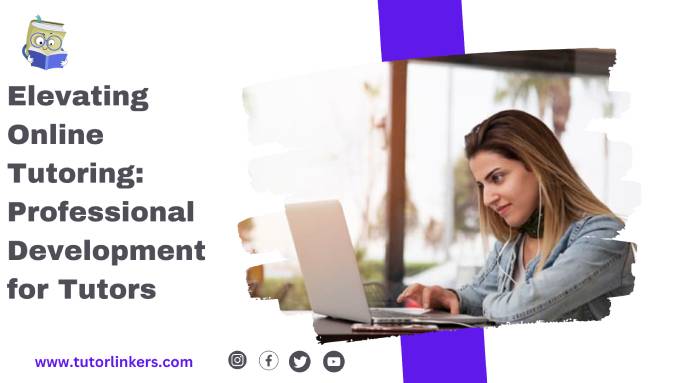Professional Development for Tutors: In the realm of education, the role of tutors extends beyond imparting knowledge; they serve as mentors, guides, and facilitators of learning. In the digital age, where online tutoring has become increasingly prevalent, the importance of professional development for tutors cannot be overstated. This blog delves into the world of professional development for online tutors, exploring its significance, key areas, strategies, and ethical considerations.
Understanding the Role of Professional Development
Professional development for online tutors encompasses a range of activities aimed at enhancing their skills, knowledge, and effectiveness in supporting student learning. It involves continuous learning and growth to stay abreast of emerging trends, best practices, and technological advancements in the field of online education. By investing in professional development, tutors can improve their teaching practices, increase student engagement, and ultimately, enhance student success.
Key Areas of Professional Development
- Pedagogical Skills Enhancement: Online tutors can benefit from training in instructional design, delivery, and assessment methods tailored to virtual learning environments. Techniques for fostering active learning, promoting critical thinking, and providing constructive feedback are essential for effective online tutoring.
- Technological Proficiency: Proficiency in utilizing online tutoring platforms, digital tools, and multimedia resources is crucial for creating interactive and engaging learning experiences. Tutors should be adept at leveraging technology to facilitate collaboration, communication, and knowledge acquisition among students.
- Communication and Interpersonal Skills: Effective communication skills are essential for building rapport, fostering a supportive learning environment, and addressing students’ diverse needs and concerns. Online tutors should develop active listening skills, empathy, and cultural sensitivity to establish meaningful connections with their students.
Strategies for Professional Development
- Participation in Workshops and Training Programs: Tutors can enhance their skills and knowledge through workshops, webinars, and training programs offered by educational institutions, professional organizations, and online platforms. These opportunities provide valuable insights into effective tutoring techniques, instructional strategies, and technology integration.
- Peer Collaboration and Mentoring: Networking with fellow tutors and engaging in peer collaboration fosters the exchange of ideas, experiences, and best practices. Mentorship relationships with experienced tutors offer guidance, support, and opportunities for professional growth and development.
- Reflective Practice and Feedback: Tutors should engage in reflective practice, critically evaluating their teaching practices, and identifying areas for improvement. Seeking feedback from students, peers, and supervisors facilitates continuous learning and enables tutors to refine their approaches based on student needs and feedback.
Assessing and Evaluating Professional Development
Continuous assessment and evaluation are essential components of professional development for online tutors. Tutors can assess their competencies, skills, and effectiveness through self-assessment, peer evaluation, and performance reviews. Utilizing student feedback and performance metrics helps tutors gauge their impact on student learning and identify areas for further growth and development.
Resources and Tools for Professional Development
A wealth of resources is available to support professional development for online tutors, including online courses, articles, books, and educational technology tools. Professional organizations and associations for tutors offer networking opportunities, resources, and professional development events tailored to the needs of online educators.
Ethical Considerations in Professional Development
Ethical considerations, such as maintaining student privacy and confidentiality, upholding professional standards, and respecting cultural diversity, are integral to professional development for online tutors. Tutors should adhere to ethical guidelines and codes of conduct in their practice, ensuring integrity, professionalism, and student well-being in virtual learning environments.
Future Trends and Innovations
Looking ahead, the future of professional development for online tutors holds promise for innovation and advancement. Emerging trends such as artificial intelligence, adaptive learning technology, and virtual reality offer opportunities to enhance tutoring effectiveness, personalize learning experiences, and address diverse student needs.
Conclusion
In conclusion, professional development is a cornerstone of effective online tutoring practice. By investing in continuous learning, growth, and reflection, tutors can enhance their skills, knowledge, and effectiveness in supporting student learning and success. Embracing professional development opportunities empowers tutors to stay informed, engaged, and inspired in their practice, ultimately benefiting both tutors and students in the dynamic world of online education.
Read more: Hybrid Tutoring: Combining Online and In-Person Strategies
FAQ’s
- What is professional development for online tutors, and why is it important?
- Professional development for online tutors refers to activities aimed at enhancing their skills, knowledge, and effectiveness in supporting student learning in virtual environments. It is important because it allows tutors to stay abreast of emerging trends, refine their teaching practices, and ultimately improve student outcomes.
- What resources and tools are available for professional development for online tutors?
- There are various resources and tools available for professional development, including online courses, articles, books, professional organizations, educational technology tools, webinars, workshops, and mentorship programs. These resources provide opportunities for tutors to deepen their knowledge, expand their skill set, and connect with peers and experts in the field.
- How can online tutors assess and evaluate their professional development progress?
- Online tutors can assess and evaluate their professional development progress through self-assessment, peer evaluation, and performance reviews. They can also utilize student feedback, performance metrics, and reflective practices to gauge their effectiveness and identify areas for improvement. Ongoing assessment and evaluation ensure continuous learning and growth in their tutoring practice.
Ehsan Ali is a seasoned content writer and researcher with a talent for translating complex concepts into clear, engaging content. With a deep understanding of human behavior, societal trends, and technical topics, Ehsan creates insightful and impactful content that resonates with a broad audience. His expertise ensures that each piece is both accessible and compelling, bridging the gap between intricate details and everyday understanding.




